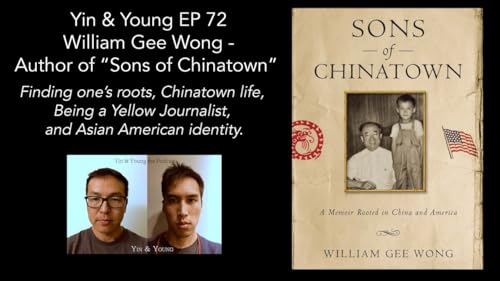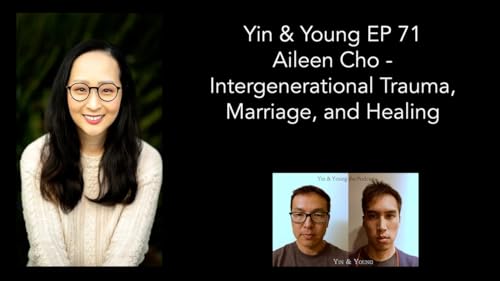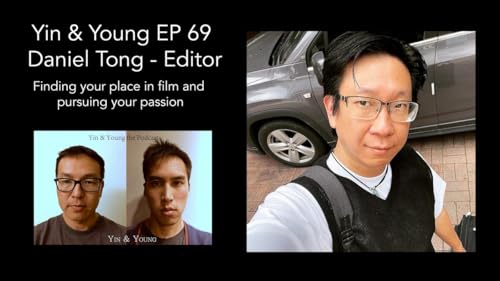After a long hiatus, Yin & Young are back with Paul Hoi, the sequel! Paul is a on a year-long sabbatical traveling the world and has spent the past few months traveling Japan. Earlier this year, James had the privilege of meeting up with him in Tokyo and we got to catch up about his travels, his new passions like skiing and scuba diving, and the reality of solo traveling. Apologies for the poor audio, especially for my mic, this was our first time trying an outdoor recording. Did our best to correct it in post, so hopefully it’s listenable! Catch our 1st interview with Paul here: https://www.jamesyshih.com/yin-young-podcast/2021/4/19/yin-and-young-ep56-paul-hoi Paul Hoi’s photography and other works: https://linktr.ee/paul_hoi Highlights: 00:01:05 Introductions & Overview: meeting up in Japan, visited Junji Ito exhibit. 00:03:53 What brought Paul to Japan. Been finding new loves: scuba diving, skiing, riding around on a moped. 00:07:27 Transitioning from working in a high stress environment to solo traveling. 00:10:08 Each of us talk about our different experiences visiting Japan and feelings about travel. 00:17:04 Driving in Japan. 00:20:02 Dan shares his experience traveling to Sasebo in Kyushu. 00:23:22 The reality of traveling: dealing w/ loneliness, language barriers, anxiety, addiction to solitude, feeling like an outsider. 00:32:33 Making friends in Japan. Dan shares Japan stories of ghost hunting, shooting fireworks, and drifting (Initial D). 00:37:41 Old-school Japan (Showa Era). See CORRECTIONS below. 00:40:20 Paul’s interests have been his north stars for traveling. Shares his story of falling in love with skiing and the differences between American and Japanese skiing. 00:48:10 The need for physical expression. Short cut to the Presence. Wordlessness. 01:00:13 Dan shares stories about what physical activities his kids enjoy doing. Language corner (01:02:23): Japanese 蟻 - ari - ants. James Shares a story about Japanese school children walking to school in an orderly fashion like ants. おじゃまします - Ojamashimasu - thank you for having me. Lit. sorry for being a hinderance. 亀 - kame - turtle. The basis for Goku’s finishing attack, Kamehamaha, which is also the name of a Hawaiian king. 迷惑 - meiwaku - to be troubled or bothered (by). Japanese culture emphasizes that one should not be a nuisance (meiwaku). お待たせしました - Omatase shimashita - sorry to have kept you waiting What you’re doing to stay balanced/present (01:11:54): James: Brazilian Jiu-Jitsu Paul: Art, skiing, scuba diving Dan: Surfing, Kung Fu ——— CORRECTIONS: 00:37:41 James incorrectly claims that 1992/93, when Dan was in Japan, was the Showa Era but actually that era was the Heisei Era (1989~2019) in Japan. The Showa Era was 1926~1989. 00:38:27 Dan and James mix up the dates about the Showa Era. The Showa Era was 1926~1989, and is generally divided into pre-war Showa Era (1926~1945), and post-war Showa Era (1945~1989). ——— Follow and connect with us on Facebook, Instagram, Youtube: @yinyoungpodcast YT: https://www.youtube.com/@yinyoungpodcast IG: https://www.instagram.com/yinyoungpodcast FB: https://www.facebook.com/yinyoungpodcast Like/comment to helps others find our work! Yin & Young is produced by James Y. Shih and Daniel Yin. Inquiries: yinyoungpodcast@gmail.com
続きを読む
一部表示
 1 時間 13 分
1 時間 13 分 1 時間 42 分
1 時間 42 分 1 時間 12 分
1 時間 12 分 1 時間 14 分
1 時間 14 分
 1 時間 5 分
1 時間 5 分 2023/04/291 時間 19 分
2023/04/291 時間 19 分 1 時間 1 分
1 時間 1 分
